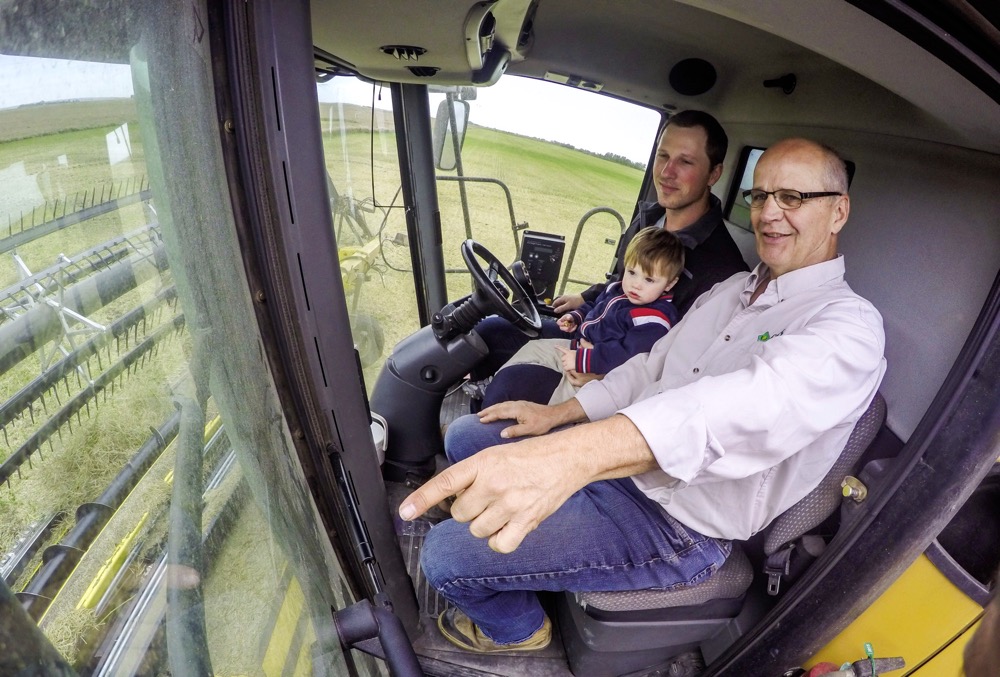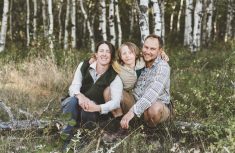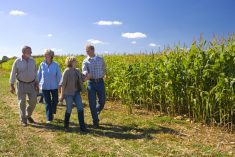Lincoln Ellis has just got his first taste of combining. “He thought it was pretty interesting for the first 10 minutes, and then he realized how small the combine cab was, and that was about it,” says his dad, Simon Ellis, with a chuckle.
“So it was short-lived, but you know, small steps for now. And as he gets older I’m sure he’ll like it… I know I certainly have good memories riding tractors and combines.”
And while it will be many seasons before one-year-old Lincoln decides whether to take the wheel at the pedigreed seed farm his parents and grandparents operate near Wawanesa, Man., it’s not to soon to start thinking about succession planning.
Read Also

Riding the tariff rollercoaster
Farmers are accustomed to roller-coaster years. But the current geopolitical windstorm is something else entirely. On his cattle operation near…
“It’s never too early, but it can be too late,” says Jolene Brown, Iowa-based professional speaker, author, farmer and family business consultant.
Succession planning isn’t about focusing on an end date — when parents retire and the next generation takes over. It’s about anticipating everything that needs to get done to facilitate that transfer, and preparing for all the unexpected things that might crop up before then, says Brown.
“Succession planning is a process.” Brown says, explaining that it isn’t at all like some kind of box that you’re supposed to put a check mark in, showing you’ve got the job all done. “It will have to be evaluated and reviewed whenever there is a major change. When someone new is brought into the business, when children are born and as they age, you’ll always have to review these documents because it’s a process.”

It also means recognizing that calamity can strike a family at any time, and that you’d have to be ready to deal with things you may not like to even think about.
“If there is that unforeseen catastrophe, death or disability, or divorce today, what will you do?” Brown asks. “You have to have a plan in place in case something happens. If this happened today, how could the business continue and not be compromised?”
For those farming with young kids or teenagers (or other young heirs), it also means deciding what kind of legacy you want for your farm business.
“So if you’ve got young kids and you want your business to continue and possibly be available for their ownership or management or leadership skills, well then you have to have a plan for who is going to lead this business now,” Brown says. “(The kids) are not ready, they’ve not been vetted, so I’m not saying they can’t be owners…things can be in a trust, but I do have a problem when we transfer ownership to people who know nothing about the business.”
But just because children are too young to run a business, it doesn’t mean they are too young to start learning how a farm works, or that it’s too early for them to start acquiring valuable skills.
“Succession planning is the transfer of labour, management and ownership. But whether or not that transfer is going to happen depends on the culture and the attitude towards agriculture that you bring to your family business,” says Elaine Froese, farm family coach from Boissevain, Man., and author of Farming’s In-Law Factor. “So you start creating attitudes that embrace farming as a business when children are very young.”
That means conversations at the kitchen table about whether they want a career in farming and if they want to be part of the family business, says Froese. It also means their spending time on the farm, helping out, or seeing what Mom and Dad are up to.
However, in many cases it’s not the older generation that broaches the issue of succession, it’s the younger generation — if succession planning gets discussed at all.
“I’m not sure what the numbers are on how many people actually do it,” says Jennifer Wright, senior human resources adviser with the Canadian Agricultural Human Resources Council. “But I can tell you anecdotally that not nearly as many people as probably should be are doing it, at least not at the right time.”
That is starting to change though. As farm businesses become larger, more are adopting formal business practices, Wright says. Many organizations representing or supporting farmers have also recognized a need for greater awareness around succession planning and are offering tools as well as planning sessions and speakers for their members.
Still, approaching the issue is fraught with emotional stumbling blocks surrounding death, entitlement and legacy.
“I think this can be especially difficult if it’s a family situation. It can be difficult for any business, but with family it can be very hard to do,” says Wright. “If you’re the younger generation looking for answers for the succession of the farm… you certainly don’t want to make it appear to your parents that you are trying to kind of push them out the door.”
Back in Wawanesa, Ellis said he’s thankful that the topic arose naturally with his parents, Warren and Karen, and siblings.
“There’s quite a bit about it in farm news and at conferences right now, and we knew that I wanted to take over the farm one day,” Ellis says. “And soon as I married Amanda, well then we knew that I had a partner who wanted to be involved in the farm as well. So I think it kind of came along naturally and we’re really quite fortunate that with my parents and us, we have a very good communication line.”
Weekly or bi-weekly meetings also allow Ellis, Amanda and his parents to discuss any issues that arise.
“Of course, during harvest it might get dropped for a month or two and then during seeding it’s probably dropped for a month or two, but it’s still a fairly regular conversation,” Ellis says, adding that there is so much more to succession planning than the monetary side.
“It’s not only a business or a job, it’s a lifestyle,” he says, explaining the hardest issue for his family so far has been figuring out changes in living arrangements.
“That’s actually one of the stumbling blocks that we’re on currently. We don’t live in the farmyard, my parents still do. But there are a lot of benefits to Amanda and myself moving into the yard because we also run a seed retail business as well. So there’s benefits there.”

That said, Ellis is confident those issues will be resolved through ongoing dialogue. But he notes that it’s not surprising issues like this prevent some farm families from making succession plans.
“There are these huge emotional attachments to things, to the farmyard, what’s been built over 30 years or 40 years,” he says.
But with a 10-year farm succession plan in place with his parents and siblings, Ellis says he can confidently plan for his son, whether or not young Lincoln decides he wants a career in agriculture.
“When he was born I think we had already established shares for Amanda and myself, and moved my parents to a preferred share status to lock in the value of the farm at that time,” he says. “So we kind of talked about it but it took a little bit before we really decided what to do and how to get moving for the next generation, as far as Lincoln was concerned.”
Wright says that if it’s difficult to get a conversation around succession going, bringing in a third-party adviser can help facilitate succession planning. They can also provide expertise around legal issues, and distance from emotional issues where it’s needed.
“Even if it’s coming from the person looking to retire, looking for a success plan to facilitate that retirement, sometimes having that third person involved can help people have that conversation without it becoming personal or anything like that… particularly when there is more than one child that is interested in the farm or has been identified as a possible successor,” says Wright.
Ellis and his family did hire a farm consultant as they worked on some portions of the plan. He says having someone else to guide the conversation helped with communication.
“She went over everybody’s goals and what our plans were as far as retirement and where we saw ourselves in two years, five years, 10 years and what values we all hold important to us,” he says. “It wasn’t the same for everybody. Everybody had different goals and aspirations and values — as expected — and there was the odd surprise in there.”
Froese says that getting the ball rolling on succession planning takes what she calls a driver, someone passionate about the issue who is willing to make meetings happen. It’s that driver who usually makes the first move towards outside expertise.
“Because nothing is going to move or shift unless appointments are made with an outside adviser and you start having meetings where everyone has a voice at the meetings to explore what everybody wants. Because the first question is: what do you want? What do you want for your lifestyle? What do you want for your income stream? Where do you want to live? What kind of role do you want on this farm?” she says. “It’s not that complicated, but farmers are highly overwhelmed because they’re avoiding conflict and they don’t want to have the tough conversations.”
Reminding the parties involved in a farm business that succession planning is not estate planning can help move the process along as well.
“Farmers get confused that estate planning is the same thing as succession planning,” Froese adds. “Estate planning is for when you’re dead, succession planning is for the transition for labour, ownership and management of the business that you’re in now. And so a lot of people are procrastinating because they think succession planning is about making a will — which you should have — but a will is part of your estate planning.”
Brown also stresses that wills don’t stand on their own where farm businesses are concerned, so buy-sell agreements are a must.
“It’s essential, and you’ve got to know what triggers it, who has the option to buy and in what order, how will the assets be appraised, what are the interest rates — and you never enter an agreement about shared assets without a way to exit it, without a way to amend it,” says Brown.
Simon Ellis says that while it’s still far too early to know if his son or any future siblings will be interested in farming, he is working to be prepared for all possibilities.
But he believes it’s also important that kids have the opportunity to explore life off the farm before deciding to commit to agriculture.
“As he gets that experience and knowledge, and then gets to the age where he wants to start making decisions he’ll have that information for himself to be able to decide whether he wants to farm or not,” says Ellis. “Hopefully he would decide to come back to the farm, but we certainly don’t want to pressure him to come back because it’s not an easy business to be in.”















